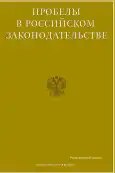Textual Analysis of Works in the History of Political and Legal Doctrines
- Authors: Korovin K.S.1
-
Affiliations:
- Ural State Law University named after V. F. Yakovlev
- Issue: Vol 16, No 1 (2023)
- Pages: 24-28
- Section: Theoretical and Historical Legal Sciences
- URL: https://journals.eco-vector.com/2072-3164/article/view/569048
- ID: 569048
Cite item
Abstract
Textology as a literary field of knowledge, however, can and should be used by legal scholars in the analysis of political steam texts. This is especially relevant for the history of political and legal doctrines, for which the text is a key element of the system. The article discusses in detail the stages of textual analysis. (1) Study of the sources of the political and legal text (manuscripts are divided into autographs (written by the author's hand) and lists (written by another hand); autographs are either drafts or white copies). (2) Establishment of a genuine political and legal text (the procedure takes place in several stages: re-construction of the history of the creation of the text, search for its main sources; arrangement of all versions of the work in chronological order with the appropriate motivation for its adoption; finding various options and editions). (3) Approval of the specific authorship of a political and legal work and dating (there are several ways of attribution: the study of various documents, sociological and linguo-stylistic analysis; methods of determining dating: paleographic (analysis of paper and handwriting of the author), determining dating according to " dating signs"). (4) The study of the genesis of a political and legal work (the content of identifying the origins of the origin of the text in the author will be the reconstruction of various events associated with the work).
Full Text
About the authors
Kirill S. Korovin
Ural State Law University named after V. F. Yakovlev
Author for correspondence.
Email: korovinscience@yandex.ru
ORCID iD: 0000-0003-1746-2458
Cand. Sci. (Law), Lecturer at the Department of Theory of State and Law
Russian Federation, YekaterinburgReferences
- Bondi S.M. Drafts of Pushkin, Articles 1930–1970 2nd ed. Moscow: Enlightenment, 1978. 231 p.
- Grishunin A.L. Research aspects of textology. M.: Heritage, 1998. 413 p.
- Kodan S.V. Source study in the structure of the history of political and legal doctrines: subject, target orientation, functions, meaning // Genesis: historical research. 2021. No. 10. Pp. 28–43.
- Kozmina E.Yu. Commenting on literary texts. Tutorial. Yekaterinburg: Ural University Press, 2015. 153 p.
- Likhachev D.S. Textology on the material of Russian literature of the X-XVII centuries / with the participation of A.A. Alekseeva and A.G. Bobrov. Leningrad: Nauka Publishing House, 1983. 645 p.
- Likhachev D.S. Textology. Brief essay. Moscow: Nauka Publishing House, 1964. 174 p.
- Racer S.A. Fundamentals of textology. Ed. 2nd Textbook for students of pedagogical institutes. Leningrad: Enlightenment, 1978. 174 p.
- Tomashevsky B.V. Writer and book. Essays on textology. Second edition. M.: Surf, 1928. 229 p.
- Eikhenbaum B. Fundamentals of tectology // Editor and book. Digest of articles. Issue three. Moscow: Art Publishing House, 1962, pp. 41–98.
Supplementary files











